The Samsung Galaxy S6 and S6 edge Review
by Joshua Ho on April 17, 2015 9:00 AM EST- Posted in
- Smartphones
- Samsung
- Mobile
- Galaxy S6
- Galaxy S6 Edge
System Performance Cont'd: GPU Performance
As previously mentioned, the Galaxy S6 uses a Mali T760MP8 clocked at 772 MHz, which should provide a healthy improvement in GPU performance over the Exynos 5433. To test this, we run through our standard suite of game-style GPU benchmarks. However, there are still some CPU benchmarks present within these tests such as the 3DMark physics test. In general though, a strong GPU is needed to perform well in these tests. For those interested in an architectural deep-dive of the Mali T760, I would refer to Ryan’s article on the Midgard architecture for more information.
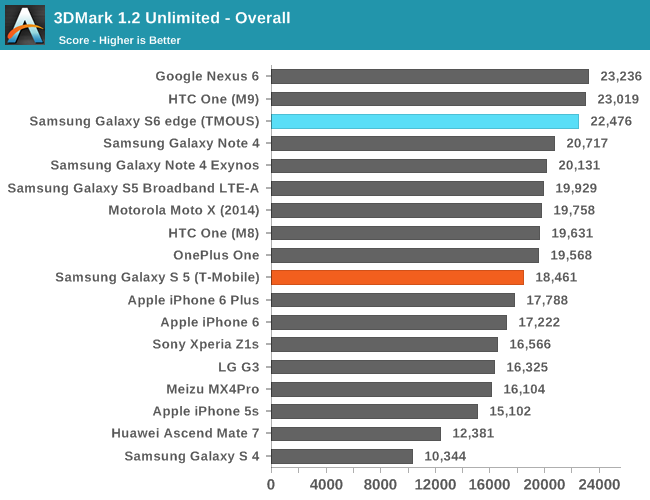
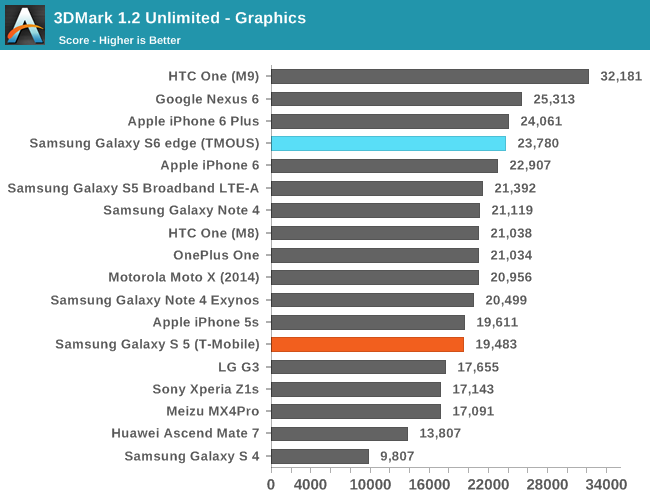
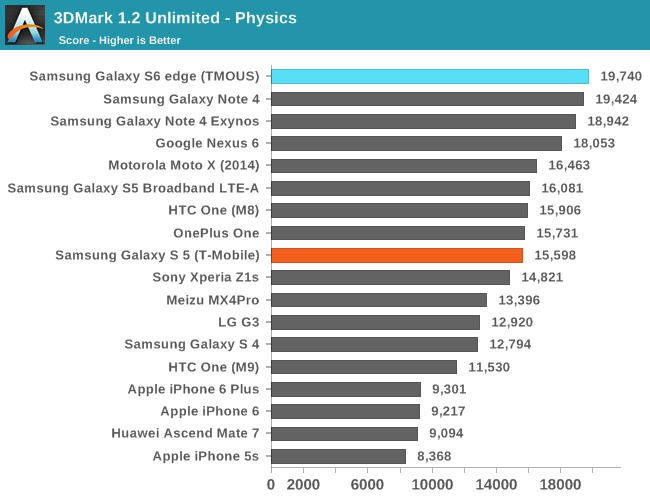
The Galaxy S6 starts out fairly strong in 3DMark. Overall performance is boosted by a chart-topping physics score, while pure graphics performance trails a bit. In this case the S6 is roughly on par with the iPhone 6 Plus, but would have to close quite a gap to catch up to the HTC One (M9).
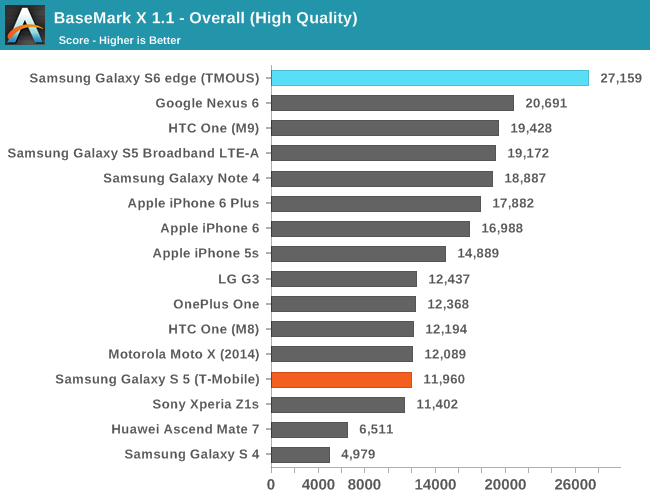
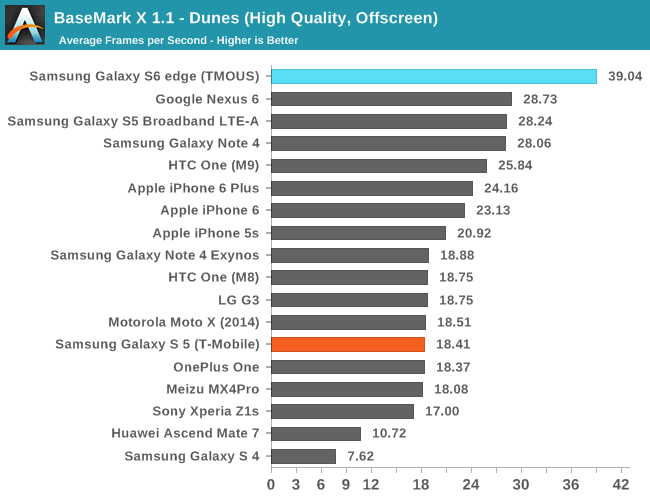
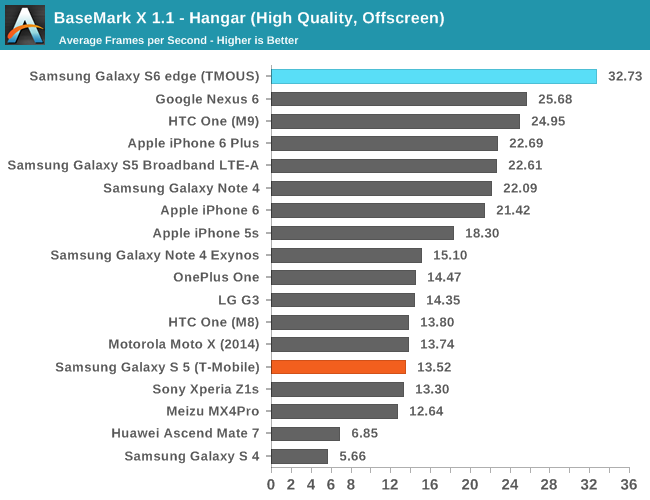
BaseMark X finds the S6 the runaway winner. The phone is well ahead in both the Dunes and Hangar test, beating the next-best phones (primarily Adreno 420/430 based) by 25% or more depending on the test. The increase over the S5 is especially remarkable; Samsung has more than doubled their performance in this benchmark in barely a year.
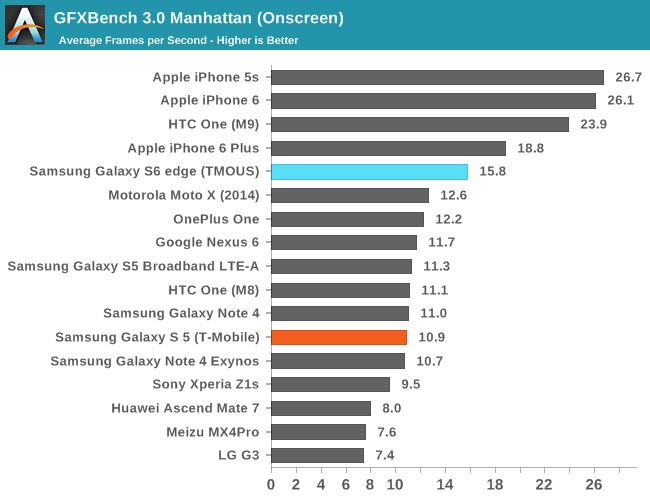
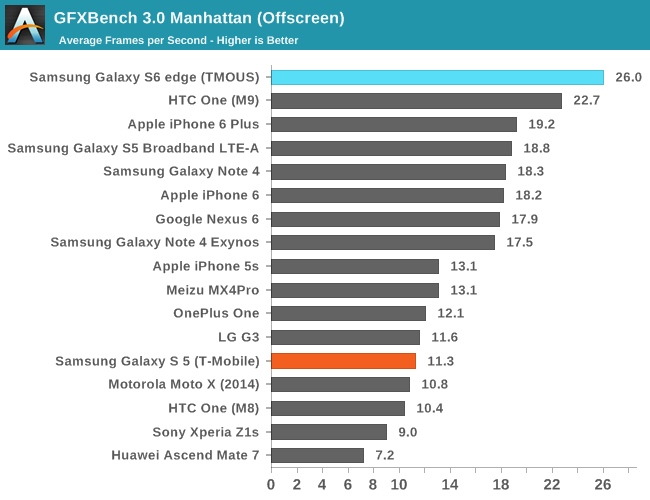
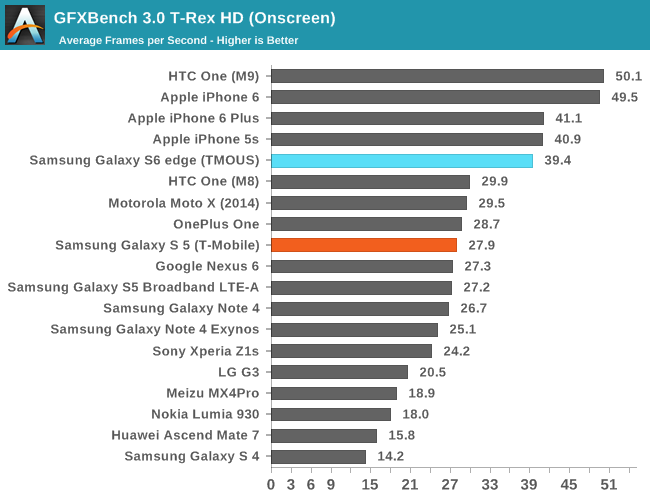
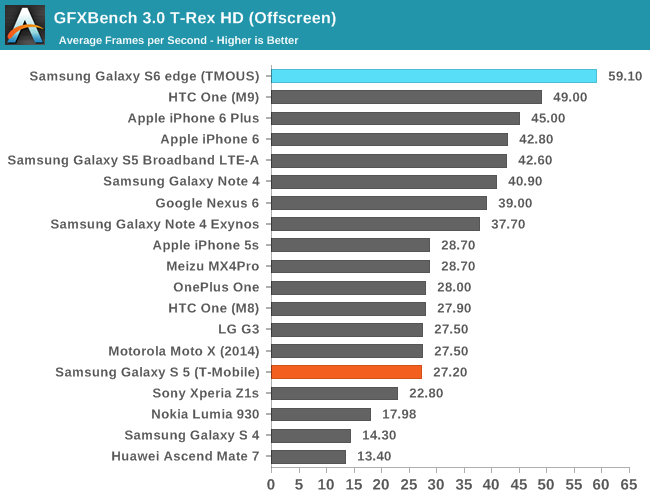
GFXBench 3.0 is another strong showing for the S6. In both offscreen tests it's 15% or more ahead of the next closest phone, which is once again the HTC One (M9). Meanwhile compared once more to the S5, Samsung's performance has more than doubled. Consequently even the onscreen tests show significant gains, as the GPU performance gain more than outstrips the additional performance required to drive the higher resolution 1440p AMOLED display of the S6.
Overall, as we can see the performance of the S6 is in line for what is expected from its Mali T760MP8 configuration. Interestingly though the phone's performance exceeds the scaling we'd expect from adding two shader cores and increasing frequency to 772 MHz, as compared to the Exynos 5433-powered Note 4 Exynos. This suggests that the Exynos 5433's GPU was bandwidth-limited to some extent, in addition to any possible thermal throttling that would occur over the course of a GFXBench run. But I suspect we'll have to save the deep dive for a future article as I can't take the review unit apart to find out.










306 Comments
View All Comments
Richa - Friday, May 15, 2015 - link
Am from India - Bangalore. I bought Samsung S6 edge 64 GB on 12th April 2015 and got to know battery is discharging rapidly within first week of use. I spoke to customer support and sent it for service center. Service center person and his manager said phone does not have any problem and returned same defect phone without fixing. Samsung is least bothered about their customers and service center guys are too unprofessional. Please help me what can be done. Battery back up is less than 3-4 hours.Samsung has the worst customer service. First they sell you defective pieces which starts showing problem within a week of purchase and then they will ask you to visit the service center 3-4 times a month just because their technical team is not strong enuff to recognizee the problem. Samsung doesnt value customer time money ... it has just some stupid people sitting at the call center whose work is to fool you and simply waste your time but wont provide genuine service or product .Samsung is the other name of Customer Harassment. My personal Experience which I am going through these days.
techconc - Tuesday, May 19, 2015 - link
@Richa:You sound surprised. Why? Is there anything in your experience history with Samsung or even stories of their customer service that leads you to believe this is an anomaly? Your experience sounds pretty consistent with my experience with them.
An Droid - Monday, May 18, 2015 - link
Try reading the article again. Maybe you will then grasp the advantages of UFS over eMMC. If you still do not understand it, look at the graphs (the pictures).schilling - Wednesday, May 20, 2015 - link
Can someone explain why the video bit rate is so high? It is common for 1080P30 H.264 video to be in the 3-5Mbps range. I get the idea of increasing bit rates to improve quality, but 17Mbps seems ridiculous. I've seen many studies that clearly show that 1080P30 H.264 quality improves very slowly for bit rates above 5Mpbs. Netflix streams 1080P30 in the 1-2Mbps range; and yes their are artifacts, but this is 17-8x higher! The only logical explanation is that Samsung Exynos 7 is taking radical short-cuts in their H.264 CODEC. For example, using only I-Frames, or keeping a very small motion search area.Does anyone have insight to this? Has anyone viewed their stream with a CODEC analysis tool like StreamEye?
Why is Samsung's bit-rate so ridiculously high?
The Rogue Tomato - Saturday, May 23, 2015 - link
Removable battery and no microSD card isn't a big deal anymore. You can get a great quick-charge-capable $20 10,000 mah external battery now that you can use with your own phone, or your girlfriend/wife/boyfriend/husband's phone, too. Just today I wanted to be able to have an extra power source for my phone and my wife's phone. A $20 thingy would be ideal for that.And although I have one with my Note 4, I don't see the point of having a microSD slot anymore. I'd rather have the faster internal storage. It's not like I'm going to carry around 100 movies on my phone. If I really want movies, I can put them on a cheap thumb drive and use OTG.
bloosted - Tuesday, July 7, 2015 - link
You guys should revisit this and do an in-depth on the different camera sensors. Now that some time has passed, it's become very clear that the isocell sensors that some gs6 owners randomly end up with are greatly inferior to the sony sensors that you originally tested. Interestingly, it seems most (if not all) of the online reviews of the s6 and s6 edge were done on phones containing the fantastic sony sensor, which received near universal praise. Tom's hardware just did a review of the two sensors and found the isocell sensor greatly lacking.